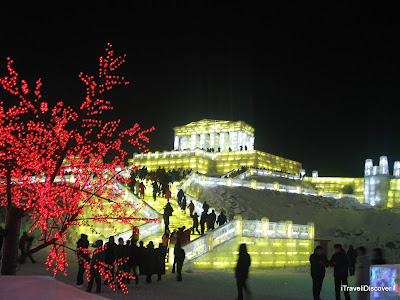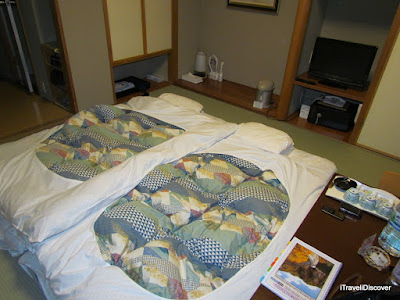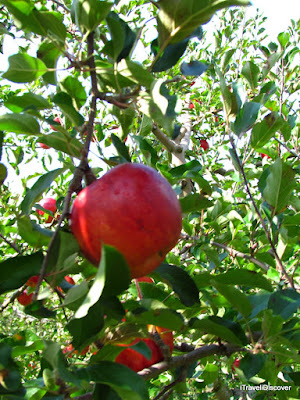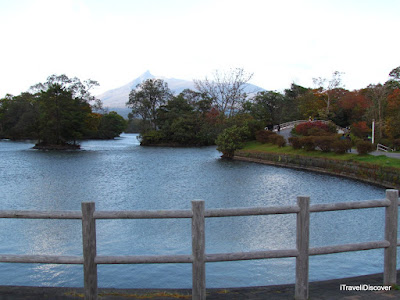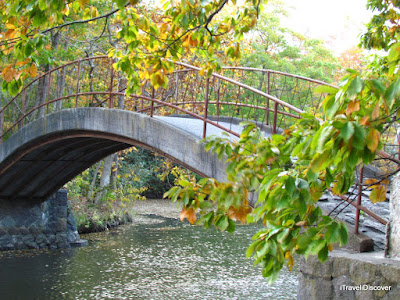In early January 2008, we spent two days visiting the northern city of Harbin in China. Known for it's world famous ice festival, Harbin attracts many visitors during the month of January. We went with a group from the Chinese Culture Club (now called Chinese Culture Center) from Beijing.
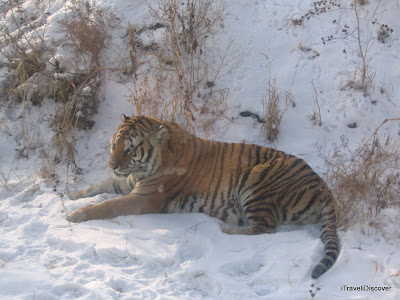 Day-1 started with an amazing visit to the Siberean Tiger Park. The park is not big. It is HUGE and apparently is the largest natural park for wild Siberian tigers in the world. We got into a beaten up old shuttle bus that creaked it way slowly into the enclosure to get closer to the animals. It was awesome to see the tigers sitting on pure white snow at minus 10 degree Celcius, without a care in the world.
Day-1 started with an amazing visit to the Siberean Tiger Park. The park is not big. It is HUGE and apparently is the largest natural park for wild Siberian tigers in the world. We got into a beaten up old shuttle bus that creaked it way slowly into the enclosure to get closer to the animals. It was awesome to see the tigers sitting on pure white snow at minus 10 degree Celcius, without a care in the world. Snack time. The park ranger drove up in his jeep and threw a live chicken out his window. The tigers quickly circled the prey, growling intensely, with their sharp eyes focussed on the prize. Who's chicken now?
Snack time. The park ranger drove up in his jeep and threw a live chicken out his window. The tigers quickly circled the prey, growling intensely, with their sharp eyes focussed on the prize. Who's chicken now?  With a quick pounce, one tiger leapt onto the roof of the jeep, and the chicken was ... well... finger lickin good. It was interesting to note that there is some etiquette between the tigers because the others did not bother to join in the chicken snack once one tiger had laid claim to it.
With a quick pounce, one tiger leapt onto the roof of the jeep, and the chicken was ... well... finger lickin good. It was interesting to note that there is some etiquette between the tigers because the others did not bother to join in the chicken snack once one tiger had laid claim to it. The signboard outside the park reveals that for a small fee, visitors can buy live animals for the rangers to feed the tigers.
The signboard outside the park reveals that for a small fee, visitors can buy live animals for the rangers to feed the tigers. And some very useful and some might think, pretty obvious things to do/not to do while at the park... it is forbidden to threaten the tigers in any way .... duh!
And some very useful and some might think, pretty obvious things to do/not to do while at the park... it is forbidden to threaten the tigers in any way .... duh! Auguste Rodin's "The Thinker' live size statue carved out of snow. What is he thinking of? ... "It's getting chilly out here... where are my clothes?"
Auguste Rodin's "The Thinker' live size statue carved out of snow. What is he thinking of? ... "It's getting chilly out here... where are my clothes?" Some of the snow sculptures were of amazing sizes. This photo puts into perspective the size of the carvings vs the people in the foreground. It's actually a mass wedding celebration.
Some of the snow sculptures were of amazing sizes. This photo puts into perspective the size of the carvings vs the people in the foreground. It's actually a mass wedding celebration. The highlight of the trip was the visit to the world famous ice festival. We braved the frigid temperature of minus 20 degrees Celsius to take in the sights at the festival. Held after sunset, colourful lights embedded within the ice blocks allow a kaleidoscope of colours to brighten up the festival. There are only three other ice festivals in the world: Japan’s Sapporo Snow Festival, Canada’s Quebec City Winter Carnival and Norway’s Ski Festival.
The highlight of the trip was the visit to the world famous ice festival. We braved the frigid temperature of minus 20 degrees Celsius to take in the sights at the festival. Held after sunset, colourful lights embedded within the ice blocks allow a kaleidoscope of colours to brighten up the festival. There are only three other ice festivals in the world: Japan’s Sapporo Snow Festival, Canada’s Quebec City Winter Carnival and Norway’s Ski Festival.










